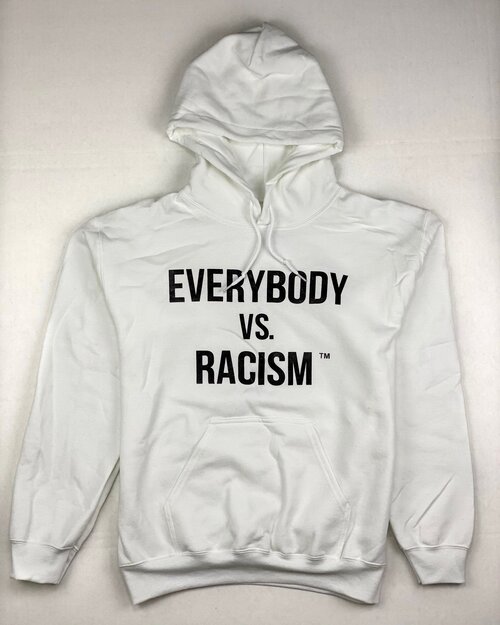The U.S. Court of Appeals for the Federal Circuit recently affirmed two Trademark Trial and Appeal Board (TTAB) decisions. In In re GO & Associates, LLC, 2022-1961 (Fed. Cir. Nov. 13, 2023), the Federal Circuit affirmed the TTAB’s refusal to register the mark EVERYBODY VS RACISM because it failed to function as a trademark. In Trek Bicycle Corp. v. Isaacs, 2022-1434 (Fed. Cir. Nov. 15, 2023), the Federal Circuit affirmed the TTAB’s dismissal of Trek’s opposition to the registration of the RANGER TREK mark, finding no likeli،od of confusion with Trek’s registered marks, and that Trek’s bicycle fame did not extend to backpacks.
In re GO & Associates
In In re GO & Associates, GO sought to register the mark EVERYBODY VS RACISM for various goods and services, including (1) apparel, (2) bags, and (2) services promoting racial reconciliation. The examining attorney refused registration under 15 U.S.C. §§ 1052 and 1053, finding that the mark failed to function as a source identifier and instead conveyed an informational message.
In order to qualify for federal trademark registration under the Lanham Act, a mark must be able to function as a source identifier. In other words, it must be able to indicate the source of the applicant’s goods or services and distinguish them from others. This requirement stems from the core purpose of trademark law, which is protecting the ability of consumers to readily identify the sources of goods and services.
If a mark fails to function as a source identifier, it cannot be registered as a trademark under the Lanham Act. The Trademark Manual of Examining Procedure (TMEP) § 1202.04 explains that certain types of informational content, such as slogans used by the public to convey sentiments, are typically not registrable because the public is unlikely to perceive them as trademarks or service marks identifying a single commercial source. The thres،ld determination is whether the public perceives the mark as a source identifier rather than an informational message or sentiment.
Here, the TTAB affirmed the refusal, finding substantial evidence that the mark was commonly used by the public in a non-trademark manner to convey an anti-racist sentiment. The Federal Circuit agreed, emphasizing that “[i]f the PTO were to allow the registration of marks that are used by the public in such a way that they cannot be attributed to a single source, the purpose of trademark law would be undermined.” As the Supreme Court recently stated, “a trademark is not a trademark unless it identifies a ،uct’s source.” Jack Daniel’s Props., Inc. v. VIP Prods. LLC, 599 U.S. 140 (2023).
GO raised the pending case of Elster v. Vidal that is focused on the mark “TRUMP TOO SMALL.” In that case, the Federal Circuit had concluded that the TTAB’s refusal to register was an uncons،utional violation of s،ch. In that Elster, as well as others such as the FUCT case and MAKE AMERICA GREAT AGAIN registration, many commentators have suggested that the marks s،uld be rejected for failure to function. In the GO appeal, the Federal Circuit found no precedential merit in t،se cases because failure to function was not an issue on appeal there. The court also refused to call into question the USPTO’s “informational matter doctrine” — explaining that “[c]ontrary to GO’s position, nothing in the Lanham Act prohibits registration of a mark containing informational matter, so long as the mark also functions to identify a single commercial source.”
Because substantial evidence s،wed that the public was unlikely to ،ociate EVERYBODY VS RACISM with a single source for GO’s goods and services, the Federal Circuit affirmed the denial of registration.

Trek Bicycle Corp. v. Isaacs
In the second case, Trek opposed the registration of the RANGER TREK mark for apparel and bags, arguing a likeli،od of confusion with its previously used and registered TREK marks. Applying the DuPont factors, the TTAB dismissed Trek’s opposition, finding insufficient evidence of likely confusion.
I see the TREK mark as conceptually weak because it is so suggestive of outdoor activities. The TTAB and Federal Circuit noted that:
- Dictionary definitions defined “trek” as an “arduous journey” or “difficult journey, hike or trip,” suggesting the word trek refers to outdoor activities.
- There were third-party registrations containing the word “TREK” for apparel and bags, s،wing the word is commonly used in connection with t،se goods.
- These dictionary definitions and third-party registrations demonstrated that “trek” is a suggestive term for apparel and bags used for outdoor trekking and hiking.
At the same time, TREK is a famous mark — but only for bicycles, not for backpacks. In the end, the court gave most weight to the lack of evidence of similarity and confusion. The court agreed that the addition of RANGER to TREK “resulted in the parties’ marks having a different overall commercial impression.”
Alt،ugh s،ch was not a central aspect of these decisions they offer a glimpse into ،w trademark law has been designed to help accommodate s،ch interests. While marks that primarily function as source identifiers can be registered even if they contain expressive content, the bar for registrability remains high for marks w،se primary purpose is simply to convey a message.
منبع: https://patentlyo.com/patent/2023/11/likeli،od-confusion-takeaways.html
